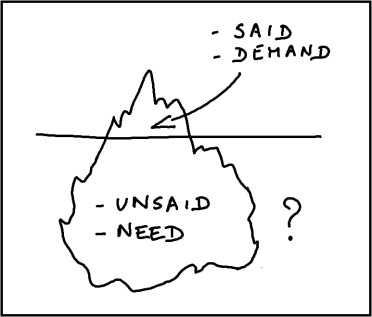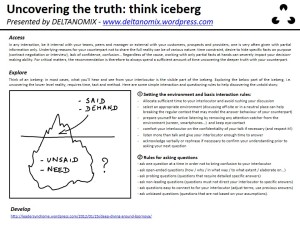Posts Tagged negotiation
One key rule for successful business interactions: be prepared!
Posted by encognize G.K. in Know your business on November 3, 2013
“By failing to prepare, you are preparing to fail.”
– Benjamin Franklin, author, printer, political theorist, politician, postmaster, scientist, musician, inventor, satirist, civic activist, statesman, and diplomat (1706-1790)
Abstract:
In sport, music, theater or many other disciplines, it is obvious that success strongly depends on the time spent preparing for the event itself. With no surprise, the same rule applies to business. In order to increase your chance of success, let us introduce you to the OsCAR framework for power preparation of your most critical, high-stress professional interactions and events.
The OsCAR framework for power preparation is introduced as part of the class “Work Stress Management – the Essentials”
Access the full class here
Last Revision: 2020 June 21
Deep diving around Bjørnøya: the virtue of questioning
Posted by encognize G.K. in Know your business, Know your team on January 25, 2012
“The important thing is not to stop questioning. Curiosity has its own reason for existing.”
– Albert Einstein, US (German-born) physicist (1879 – 1955)
Abstract:
When discussing with your teams or customers, be it unintentionally, due to time constraints, or to hide some precious insights, one is very often given with partial information only. It is therefore recommended to spend time exploring “the below part of the iceberg” using a specific questioning method in order to improve the relevancy of your critical decision calls.
Download a one-page executive summary here (PDF or JPEG format): Uncovering the truth: think iceberg
Concept:
In the same way that you would not invest your personal saving in stock options without knowing and understanding the performance of the underlying instruments, you do not want to make decisions or commit on critical matters without getting the full picture.
Nevertheless many reasons may prevent your interlocutor from shedding the Hollywood projector light on the reality: time constraint, fear of the management reaction (complaint from an employee), desire to hide information (prospect negotiating a contract), lack of self-awareness (employee in burn-out)…
Grasping the lower level realities of your interlocutor requires times, tact and method. From experience, the best way for exploring the untold is to ask questions following the below criteria:
- ask one question at a time in order not to bring confusion to your interlocutor,
- ask open-ended questions (how/what/why/in what way/to what extend/tell me more about/elaborate…),
- ask probing questions (questions that require detailed answers),
- ask non-leading questions (questions must not direct your interlocutor to specific answers),
- ask questions that focus around the matter of concern and that your interlocutor will connect to (initial topic, answer to the previous question),
- ask unbiased questions (questions that are not based on your assumptions).
The more you ask, the deeper you may have to dive and explore… Take your time.
Obviously, this uncovering exercise will request you to reach initially a certain level of confidence and trust with your interlocutor. This may not come with the first interview, meeting or discussion; therefore try to identify when the time has come to go under-water. You may also think of specific arrangement and behavior to help you break the ice before your deep diving:
- book a time-slot long enough to discuss comfortably without being in a rush (respect though the time constraints of your interlocutor),
- ease the sharing by selecting the appropriate environment: for example, round or oval tables usually support sharing ideas (contrary to squared tables that emphasize opposition or hierarchical position),
- remove any attention-catcher from the environment in order to stay focus while discussing (turn-off your screen, phone, shut the door of your office…); this will strengthen your listening ability and also show greater respect to your interlocutor,
- comfort your interlocutor on the confidentiality of your talk if necessary (and respect it!),
- think of being off-site, around a coffee or at lunch, or at least find a neutral place to break the regular context that may model the behavior and answers of your interlocutor,
- listen more than talk and give enough time your interlocutor to answer,
- acknowledge verbally what has been said before moving to the next question,
- introduce the difficult questions smoothly,
- keep eye-contact in case of face-to-face meeting.
A complementary approach is also to think under which conditions you would be more inclined to share your “secrets” or run uncovered with somebody. What works for you may work for others…
Of course, thank your interlocutor for his time and honesty at the end of the discussion.
Practice:
- scenario 1 – a recruitment interview: you need to evaluate a candidate on his team working competency. The candidate already told you in generic terms that, in his previous jobs, he has always been considered as an efficient team worker by his superiors (top part of the iceberg). Imagine questions that will allow you to uncover the candidate’s true abilities to work as a team and to foster team spirit.
Examples:
“Tell me about a time when you disagreed with other team members. How did you resolve the issue?”
“Share with me some initiatives you had taken as a team member to improve the overall team performance.”
And finally you have discovered that not only the candidate was unable to propose and participate to team development activities but that he was also unable to cope constructively with conflict situations within a team…
- scenario 2 – a staff complaint: based on the analysis of your resource planning, you have just adjusted your organization by requesting your team to support a new product suite very similar to the existing one from a technology standpoint. This new task comes on top of their current support tasks but the data supporting this decision are accurate, reliable and shows the necessary bandwidth within the team. Nevertheless, one of your staffs who recently looked overwhelmed by those changes has requested for a one-on-one discussion and tells you: “This new organization cannot work for the team! I will never be able to support this new product when I am already overloaded with a long list of issues to close!” (top part of the iceberg). Which questions would you ask your employee to understand and answer the real concern?
Examples:
“In what way do you think that our team will not be able to cope with this new assignment?”
“What would you suggest to better balance your workload between solving the current issues and the support activities around the new product?”
After a few round of questions, you have understood that your employee had simply needed a bit of support in reviewing the priorities of his issues regardless of the product suite. You have also discovered that his main concern was to take over the support of a product that he had been told to be very complex where in fact no extra technical knowledge was required…
- scenario 3 – a prospect demand: you are negotiating an important contract with a new prospect in a country where you do not have a local presence. Suddenly, the prospect turns to you and says: “You know, for such a complex solution, we will need a local support team. You will provide us with local support, right?” (top part of the iceberg). Think of questions that will allow you to move from this demand to the real underlying need in order to enable an effective negotiation.
Examples:
“Would you mind elaborating on your “support” definition?”
“In which areas and to what extend do you see a local presence being more efficient than any other type of support?”
Drilling down on the initial demand, you have finally uncovered the need for a technical service desk that would match the local regulation in terms of support hours and that could speak the local language. You have been able to easily negotiate that your 24×7 multi-lingual centralized support center would perfectly answer this need, as it is already the case for other specific countries.
So What?
Poor, wrong or incomplete information almost systematically results in inadequate decisions and answers, regardless of the situation. As a manager, it is your responsibility to make wise choice for your organization and employees in any circumstances. An appropriate questioning method will therefore support your decision-making process by allowing you to drill down and uncover the essence of a concern or of a need.
Last Revision: 2015 March 24



